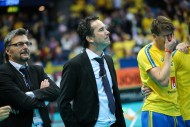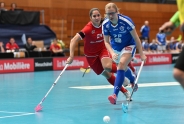07.
2015
Vaara: Man with the golden touch
Top player in the 80’s. Top player in the 90’s. Top coach in the 21st century. The head coach of Sweden Jan-Erik Vaara has stayed a significant name through the history of floorball since its childhood to this very day.
 After three WFCs victories with the female team, Jan-Erik Vaara became the head coach of the male team of Sweden and managed to bring it back to the top. (photo Erwin Keller)
After three WFCs victories with the female team, Jan-Erik Vaara became the head coach of the male team of Sweden and managed to bring it back to the top. (photo Erwin Keller)
Jan-Erik Vaara’s record as a head coach for Sweden’s national teams is in a class of his own. In five WFC tournaments he has led his country to five gold medals.
Vaara made his debut as head coach of Swden in 2005. The female national team had just returned from Singapore with a for floorball’s home country a shameful bronze medal and it did not look much better for already quite some time. Out of four women’s WFC tournaments (1999, 2001, 2003 and 2005), Sweden had only won one. With Vaara in the lead, things took a new turn. Sweden crushed their opponents and took themselves back to the throne in Fredrikshavn 2007 with a 7:3 final victory against Finland.
Through the next years, Vaara’s Sweden went on to dominate women’s floorball. In Västerås in 2009, it was time for their next gold after 6:2 in the final against Switzerland and in 2011 in St. Gallen it was again Finland who got to witness the Swedes’ gold celebration after a 4:2 victory.
After WFC 2011, leaving his position to take over the male team of Sweden, Vaara had established an impressive record with the female team - 35 straight games without a loss under his leadership. “It is certainly an advantage to have so many good players to choose the national team from,” Vaara waves the attention further from his personal performance. “It is also essential to have a coaching team where everyone has a professional way of thinking and who always give their 100 percent and I think, that’s what we´ve had!” It might be coincidental but yet so fitting, that in Sweden’s first women’s international game after Vaara’s time they lost against Finland.
Uneasy decisions
When Jan-Erik Vaara took over the male team of Sweden, its situation was quite alike the one of women in 2005. Sweden had sensationally lost a WFC final against Finland not once but twice. Raising the level of a national team was not easy and Vaara had to show character and leadership. To succeed, more than before was expected from the players and unhappy murmur was to be heard when certain “big players” suddenly found their names missing from the national team list. “We made certain decisions that were not always easy or nice and introduced the players to a higher level of standard than before. We wanted more intensity, more speed and a higher class of performance in everything they did.”
The results got materialized not only in medals but also shown in the level of play. Vaara’s Sweden not only won games but dominated them, never slowing down whatever the result. Heading for the net instead of the corners of the rink, always looking to shoot and score. Sweden had always known how to work effectively in offense but during Vaara’s time, scores like 23-1, 23-0, 28-1 and 30-0 told their own story. No opponent was shown mercy as Sweden always headed for more and more and more.
Vaara certainly showed why he was the right man to bring the team back to its feet and again what happened was impressive. The methods as well as the results were very, very similar to the ones of the women’s team. The first big test waited in the WFC final against Finland in Zürich in 2012 and everybody remembers what happened: Sweden won 11-5 after for Finland humiliating 9-0 second period lead. Two years later in Gothenburg Vaara’s team went for the ultimate: Another WFC gold celebrated in front of the home crowd. That victory was something special even for the most experienced players.
The Finnish migrants
In the 1960’s, 200 thousand Finns moved to Sweden looking for work and a better future. Jan-Erik Vaara’s family was among them and the northern exodus affected floorball history, too. Vaara, Esa Karjalainen (73 games for the Swedish national team), Keijo Pollari, coach Jorma Keskisarja and many other Finnish names were among the group of youngsters that discovered floorball in the Swedish town of Mariestad in the 1980’s. Legendary Lockerud IBK was founded to become the first floorball giant winning five Swedish titles. “We practiced 3-4 times a week and among players like that every session was incredibly tough and competitive as everyone always wanted to win. Our preseason training was brutal, too, because of all that competitiveness,” remembers Vaara.
Jan-Erik Vaara played 62 international games for Sweden, first becoming European Champion in 1994 and then winning WFC titles in 1996 and 1998. During those years it was usually obvious before the first whistle that Sweden would win. He never lost interest, though, even when it took nine years from the first international game to the first European Championships in 1994. “It was always an honor belonging to the ones chosen by the national team coaches. Even when the scores got big, it never got uninteresting because you always wanted to win and perform your best. You could always find challenges for yourself or for your line within the game or a single shift.”
Like many top coaches to be, Jan-Erik Vaara had it in him already as a player. His coaching career started as a bit of a slump, though, when legendary Karlstad floorball character Kjell ”Tjålan” Johansson asked him to be a coach of Karlstad’s female team. “It was not so much the development of floorball as a sport that I had in mind, but most of all getting a team to perform better technically, tactically as well as physically.”
No gold means worries
With a career like Jan-Erik Vaara’s, one cannot avoid speculation whether his next challenge some day might be raising another country e.g. Switzerland or Finland to a new level. With his Finnish roots and fluent skill of the language, his name has been regularly mentioned in the country. With the male U19 team of Sweden losing against Switzerland and Czechs and being the first ever Swedish national team without a WFC medal (Helsingborg 2015) there may yet be urgent tasks even in his own country. "Anything but a gold medal is always something to worry about for a Swedish national floorball team. There will be consequences and actions to correct the situation!"







QPbmCRVM 45.153.34.240
10. 09. 2025
QPbmCRVM 45.153.34.240
10. 09. 2025
QPbmCRVM 45.153.34.240
10. 09. 2025
QPbmCRVM 45.153.34.240
10. 09. 2025
QPbmCRVM 45.153.34.240
10. 09. 2025
QPbmCRVM 45.153.34.240
10. 09. 2025
QPbmCRVM 45.153.34.240
10. 09. 2025
QPbmCRVM 45.153.34.240
10. 09. 2025
QPbmCRVM 45.153.34.240
10. 09. 2025
QPbmCRVM 45.153.34.240
10. 09. 2025
QPbmCRVM 45.153.34.240
10. 09. 2025
QPbmCRVM 45.153.34.240
10. 09. 2025